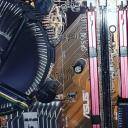AMD accuses BAPCo and Intel of cheating with Sysmark benchmarks
-
Featured Topics
-
Topics
-
McBeth1087 ·
Posted in New Builds and Planning0 -
0
-
NamelessUser ·
Posted in Troubleshooting1 -
HereWeGo ·
Posted in Power Supplies1 -
Ariolander ·
Posted in Linux, macOS and Everything Not-Windows2 -
0
-
MorbidlyOBeast ·
Posted in Troubleshooting1 -
2
-
2
-
QuacksLxgic ·
Posted in Troubleshooting4
-


















Create an account or sign in to comment
You need to be a member in order to leave a comment
Create an account
Sign up for a new account in our community. It's easy!
Register a new accountSign in
Already have an account? Sign in here.
Sign In Now